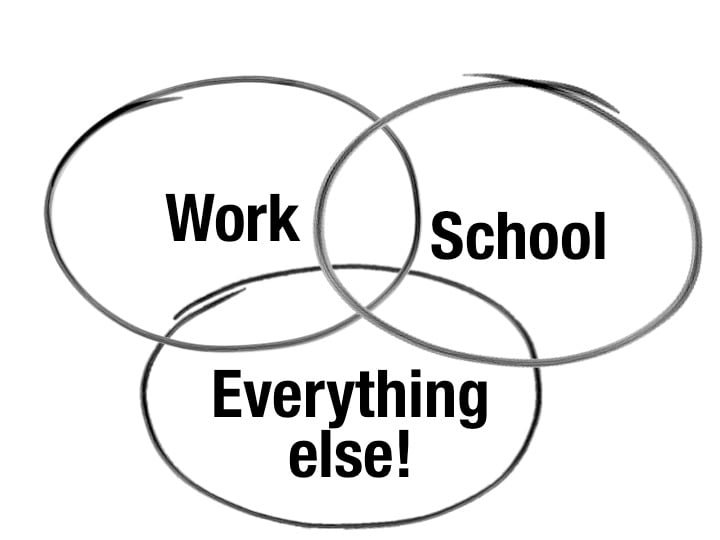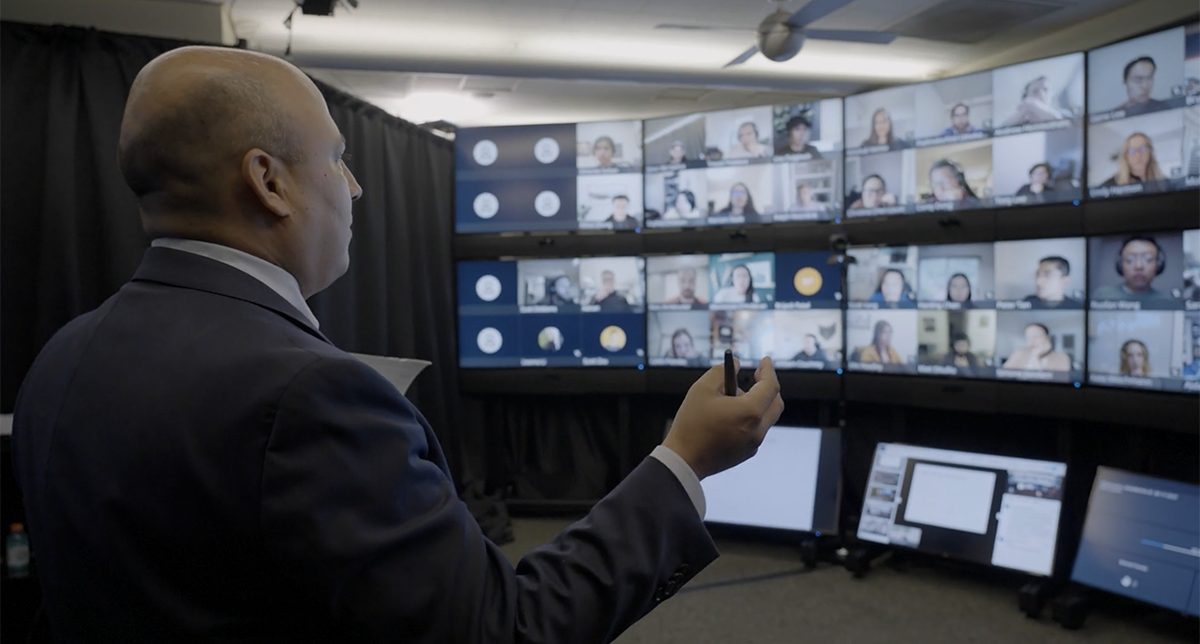Despite what people tell you, there’s no such thing as a good work-life balance. And, since you’re considering applying to the Evening & Weekend Berkeley MBA program (EWMBA), I should warn you that when you throw school into that, the difficulty of “balancing” goes even further out the window.
But what you can do – what I did – is figure out work-school-life integration. That’s what made my first year in the EWMBA program fun and successful.
On paper, it probably looked like I’d never have figured this out. For starters, I'm a “non-traditional student.” You might wonder what it takes to call yourself "non-traditional" in a group as diverse as Haas. That's easy: At 44, I'm a solid 12 years older than the average of the rest of my second-year class. Also, I was in the minority – 20% if memory serves – of my classmates that entered the program already having children. I had (and, for the record, still have) two. Here we are below:

I did not know how I could continue performing at work, attend to our growing array of family obligations and kid activities, and perform as well as I wanted during the first year of the program. I went into it assuming that something would have to fall off.
But, as classes started, something surprising happened. I didn’t have to manage three separate buckets of responsibilities. Instead, I realized I was confronting a Venn diagram with three circles. And as soon as I started treating work, school, and the rest of my life as such, I realized that I didn’t have to balance them in order to manage them.
The first surprise was how easy it was to integrate school into family life. My wife went to Cal for undergrad, and earned an MBA in a full-time program many years ago. So she was both understanding and supportive. Understanding, because she’d been through the coursework of a top-tier program and understood the time commitment. Supportive, because she knew that the long-term benefits far outweighed the costs.
Julie was doubly supportive, too, because she knew that my affiliation with Cal would guarantee that I’d root for the Golden Bears, rather than for the other PAC-12 teams with which I had earlier academic affiliations. She insists that I signed something to that effect during the application process, even. (I can’t find a copy of that document, but I’ve become a Cal fan nonetheless.)
It wasn’t just my wife that became part of the school experience. Thanks to some fortunate geography, I hosted a lot of study groups at my house. As soon as my kids, ages six and four at the time, met a few of my classmates while we were working on Microecon problem sets around my kitchen table, they started asking about my “math friends” all the time. When I’d head off to school on Saturday mornings, they understood what I was doing – or at least who I was doing it with. That made the occasional missed t-ball game a little bit easier for all of us.
In fact, the harder I worked and the more haggard I felt around each set of finals, the more the kids wanted to help. They asked me what I was doing each week, and I loved sharing it with them. They made new blue and gold Rainbow Loom bracelets for me to wear during finals. Benjamin and Rebekah were as much a part of my first-year experience as any classmate was.
Speaking of classmates, they too were more understanding than I’d expected. We all worked hard, but they also accommodated my schedule, starting many of our study groups after my kids’ 8 pm bedtime.
When the kids occasionally popped up to say hi, it was a welcome interruption -- and it reminded me why I'm working so hard in the program.
Just as the line between school and family blurred, so too did the work-school separation begin to dissipate. Classroom discussions often became ideas to bring into the office. Having “Leading People” (called "Organizational Behavior" in other programs) at the front end of the program, for instance, allowed many of us to see our companies from different perspectives. We started doing things differently to show the value of the program to our work teams.
Many companies help Evening & Weekend MBA students pay for their program. Many of my classmates started paying that back, in-kind, before the first tuition check cleared. That made it easier for us to sell our managers on needing to leave a little early some days, or to take short-notice time off to finish a group project. Managers saw benefits right away.
So, as you’re contemplating the challenges you’ll face in the program, don’t overlook those benefits.
Expect to be busier than you’ve ever been, and accomplish more and have more fun in the process.
Get ready to forge close friendships that, rather than taking away from your bonds with you family and friends, enhance them.
Embrace the program for what it will bring into your (admittedly, already quite full) life for the next three years, as well as for its long-term benefits.







